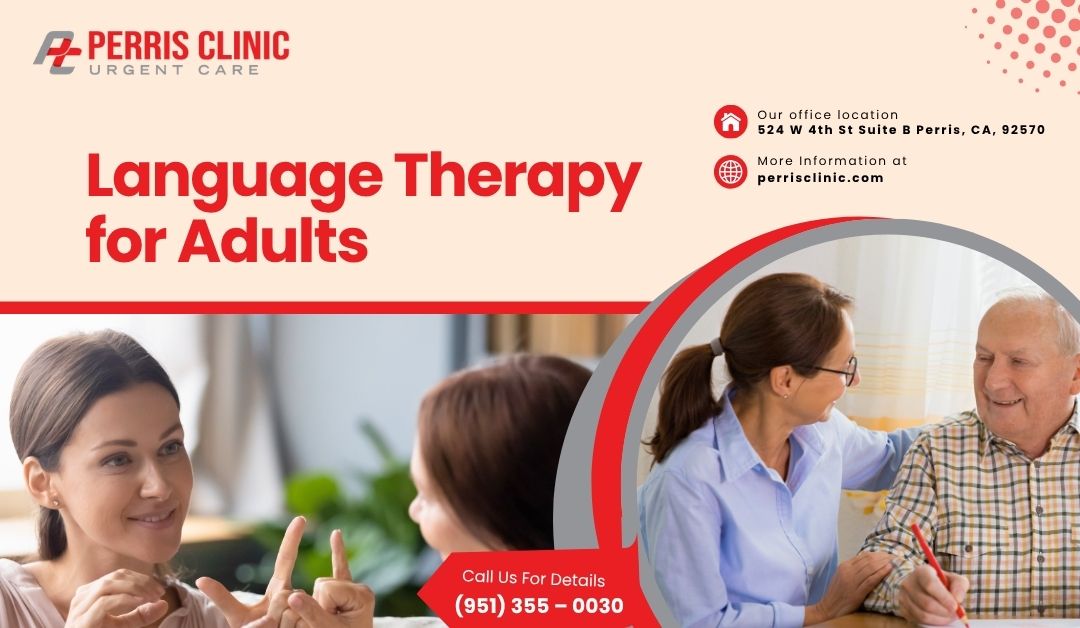Language therapy for adults helps individuals communicate more effectively. It can help after a stroke, head injury, or illness like dementia. Some adults have had trouble talking or following words since they were young. This therapy can help fix that. It’s not just about words. It helps people feel sure of themselves. It helps with talking at home, at work, or with friends.
A speech-language pathologist creates a personalized plan for each individual. You may work on saying words, asking questions, or joining talks. At Perris Clinic, you receive genuine help from caring individuals who want to see you succeed.
What Is Language Therapy for Adults?
Language therapy for adults helps people who have trouble speaking, understanding, reading, or writing. It focuses on real-life needs and helps improve daily conversations, memory, and confidence.
How Is It Different from Speech Therapy?
Many people mistakenly believe that speech therapy and language therapy are the same. They are close, but not quite. Speech therapy focuses on how you say words. It helps with voice problems, stuttering, or difficulties with mouth movements that affect sound production.
Language therapy is different. It helps with the meaning and use of words. It enables you to find the right words, follow directions, or put thoughts into complete sentences. This type of therapy focuses on how you understand and share ideas, rather than just how words sound.
What Problems Can It Help With?
Language therapy helps adults who deal with:
- Aphasia after a stroke
- Trouble finding the right words
- Getting stuck mid-sentence
- Not understanding what others say.
- Reading or writing problems
It’s also helpful for people with brain injuries, dementia, or conditions like Parkinson’s disease. These issues can make it hard to join in conversations, answer questions, or follow a story.
What Makes Adult Therapy Different?
Therapy for adults differs from therapy for children. Adults face real-world tasks, such as making phone calls, attending meetings, or conversing with family and friends. Adult sessions focus on tangible goals. The therapist may help with job talks, everyday questions, or how to ask for help. At Perris Clinic, each plan fits the adult’s life. The goal is to make talking easier and more natural, with no pressure and no rush.
Common Conditions That Benefit From Adult Language Therapy
Many adults lose their ability to speak or understand words due to injury or illness. Language therapy helps them regain their voice and rebuild their skills. It supports people with stroke, brain injury, memory loss, or speech problems. The goal is to help them feel more confident every day.
Aphasia After a Stroke
Aphasia is common after a stroke. It affects how the brain understands and uses language. A person with aphasia might know what they want to say, but the words don’t come out right. Some speak in short or broken sentences. Others may not speak at all. For example, someone may try to say “coffee” and end up saying “cookie” by mistake. Language therapy helps retrain the brain to find the right words again. With practice and support, speech improves over time.
Traumatic Brain Injury (TBI)
Traumatic Brain Injury (TBI) can happen after a fall, a car accident, or a brutal hit to the head. It often leads to problems with memory, focus, and speech. Some people forget simple words. Others mix up what they want to say. Therapy helps them slow down, think clearly, and speak with more ease.
Dementia and Language Loss
People with dementia often lose their ability to follow conversations. They may repeat questions or forget the names of loved ones. This makes talking with others challenging and frustrating. Language therapy supports them by using pictures, simple tasks, and memory aids. It helps them stay connected as long as possible.
Voice and Fluency Problems
Some adults speak too softly, stutter, or lose their voice after undergoing surgery or experiencing an illness. This can make work and social life difficult. A speech-language pathologist teaches ways to speak more clearly and calmly. They also guide breathing and pacing, which helps fluency and confidence.
How Does Language Therapy Work?
Language therapy starts with a clear plan. First, the therapist finds out what the person needs help with. Then they create simple, practical steps to work on speaking, understanding, reading, or writing. Every session builds fundamental skills that improve daily life, one small goal at a time.

Step 1: The Evaluation
The first step is an evaluation. A licensed speech-language pathologist meets with the individual to assess their communication needs and determine the best course of action. They might ask questions, show pictures, or give short reading tasks. This helps the therapist understand what the person can do and where they need support.
Step 2: Making a Personal Plan
After the evaluation, the therapist makes a plan. This plan is tailored to the individual’s life and goals. For example, one person may want to improve their public speaking skills at work. Another may want to follow conversations at home.
Step 3: The Therapy Sessions
During each session, the person works on simple tasks. They may name pictures, practice saying words, or answer short questions. Some use memory games or reading tasks.
Step 4: Practice in Real Life
Therapy is not just about doing drills. The person learns how to apply their skills in real-life situations. They may practice making a phone call, joining a talk, or ordering food. These small wins make a big difference.
Benefits of Language Therapy for Adults
Language therapy helps more than just speech. It gives people the tools to regain their confidence. It supports real-life conversations, relationships, and even job success. With the help of a speech-language pathologist, adults often experience steady progress in their speaking, listening, and ability to connect with others.
Clearer Communication
Many adults struggle with word-finding, sentence building, or understanding others. This can make talking feel stressful. Therapy helps improve these skills gradually. People learn how to start conversations, stay on topic, and respond clearly. This makes daily chats feel more natural and more effortless to engage in.
More Confidence
When someone struggles to speak well, they may avoid talking altogether. They might stop going out or feel shy around others. Over time, this can lead to sadness or isolation. Language therapy builds small wins that boost self-esteem. Each session helps people feel more confident in speaking and being heard.
Better Social and Family Life
Talking is key to every relationship. When speech is unclear, it can lead to misunderstandings, hurt feelings, or a communication breakdown. Therapy helps rebuild those bridges. Adults learn how to share their thoughts, ask for help, and appreciate simple moments again, such as telling a story or laughing with loved ones.
Support for Work and Daily Tasks
Language problems can impact jobs, meetings, or even simple tasks, such as requesting assistance. Therapy focuses on real situations. People may practice asking questions, giving directions, or interacting with customers in a work setting.
When Should an Adult Consider Language Therapy?
Some adults know they need help. Others aren’t sure. If speaking or understanding words feels more challenging than it used to, therapy may be beneficial. Language problems are not always easy to spot. But if they start to affect work, home life, or social time, it’s a good time to ask for support.
Trouble Speaking or Finding Words
You may know what you want to say, but the words just won’t come. Or you say the wrong word by mistake. This can be frustrating and even embarrassing. If this happens frequently, a speech-language pathologist can help you learn ways to express your thoughts more clearly and effectively.
Problems Understanding Others
Some people struggle to follow lengthy discussions or get lost in group chats. They may ask others to repeat things a lot. This can happen after a stroke, a brain injury, or as part of aging. Therapy helps improve listening, memory, and response time in real-life situations.
Avoiding Conversations or Social Events
When talking becomes hard, many people pull away. They might avoid phone calls, family dinners, or even simple questions. This can lead to feelings of sadness and loneliness. Language therapy helps restore those moments, allowing people to feel connected and part of life again.
Why Choose Perris Clinic for Adult Language Therapy
Not all clinics are the same. At Perris Clinic, language therapy is personalized, flexible, and tailored to real-life goals. You won’t get a one-size-fits-all plan. You’ll get support that fits your needs, whether you’re dealing with aphasia, brain injury, or just want to feel more confident while speaking.

One-on-One Expert Support
At Perris Clinic, you work closely with a licensed speech-language pathologist who truly listens to you. Each session is private, focused, and shaped by what matters most to you. That might mean working on phone calls, everyday chats, or how to explain your thoughts more clearly.
Real-Life Progress, Not Just Practice
Therapy here isn’t just drills or word games. It’s real-world practice. Want to talk better at work? Speak up during family dinners? Order your food again? We help with that. Every session is designed to make your daily life easier and more comfortable.
Warm, Caring Environment
Feeling safe matters. At Perris Clinic, you won’t be rushed or judged. You’ll be supported, whether your speech issue is new or something you’ve been living with for years. We build trust first, then help you move at your own pace.
What to Expect in an Adult Language Therapy Session
Your first session may feel new, but it’s not scary. A licensed speech therapist will talk with you, ask questions, and see how you communicate. From there, you’ll work together to build a plan. Each session helps you move closer to your goal, one step at a time.
First Step: A Simple Evaluation
The first visit is about getting to know you. The therapist will ask about your history, listen to how you speak, and notice what comes easily or what is challenging for you. You may be asked to name items, follow directions, or engage in a brief conversation. It’s relaxed, not a test, just a starting point.
A Plan Made Just for You
After the evaluation, you’ll get a custom plan. No two people are the same. Some focus on aphasia recovery, others aim to speak more effectively at work, and others require assistance in following conversations. The plan is tailored to your pace, goals, and comfort level.
Sessions That Fit Real Life
Each session may include activities such as talking, listening tasks, games, writing, or memory work. If you need help with phone calls, ordering food, or participating in group discussions, that’s what you’ll work on. You’ll build fundamental skills in real ways, with support every step of the way.
How Long Does Language Therapy Take for Adults?
There’s no set time for language therapy. It depends on your needs, goals, and progress. Some people come for a few weeks. Others need more extended support. What matters is steady progress. Your therapist will track changes and adjust the plan so every session moves you forward, at your own pace.
It Depends on the Condition
If you’re recovering from a stroke, you may need more time. People with aphasia or brain injury often need months. For mild communication issues, a few weeks can make a big difference. The time depends on how your brain heals and how often you attend sessions.
Everyone Has Different Goals
Some people simply want to feel more confident when speaking at work. Others wish to rebuild full conversation skills after an injury. Your adult communication goals shape the timeline. If your goal is simple, therapy may be short. If it’s complex, it may take longer, and that’s okay.
Progress Happens in Steps
Therapy isn’t a straight line. Some weeks will feel fast. Others may feel slow. But small steps lead to significant change. Your therapist will check in frequently, adjust your language exercises as needed, and celebrate your successes with you. You’ll always know how far you’ve come and what’s next.
Start Your Language Therapy Journey at Perris Clinic
If you or a loved one is ready to improve communication, Perris Clinic is here to help. Our licensed speech-language pathologists offer personalized language therapy for adults in Perris and nearby areas. Whether you are recovering from a stroke, brain injury, or dealing with other speech challenges, we provide real support that fits your life.
Booking a consultation is easy. You can call us now or send a message through our contact page. Our team will guide you through the following steps and address any questions you may have.
We understand life is busy, so we offer flexible hours to fit your schedule. If you prefer, online appointments are also available. This way, you can get expert care from the comfort of your home. Don’t wait to take the first step. Book your language therapy consultation today and start speaking with confidence again.
Conclusion
Language therapy for adults can help you or your loved ones communicate more effectively, both in terms of speaking and understanding. Whether it’s after a stroke, brain injury, or another condition, therapy offers real support for everyday life.
At Perris Clinic, you’ll find caring experts who work with you step by step. With flexible hours and online sessions, getting help is easy and fits your schedule. Don’t let communication problems hold you back. Reach out today, and take the first step toward clearer, stronger speech and a better quality of life.
FAQs About Adult Language Therapy
Is it too late to start therapy as an adult?
No, it’s never too late. Adults can improve communication skills at any age. Therapy helps the brain adapt and recover, even years after injury or illness.
How long does therapy take?
Therapy length varies. Some people see progress in weeks. Others need months, depending on their condition and goals. Your therapist will guide you through the process.
Does insurance cover language therapy?
Many insurance plans cover language therapy. It depends on your provider and plan. Contact your insurance company or Perris Clinic for details and help with claims.
Can therapy be done online?
Yes! Online appointments are available. You can receive expert care from the comfort of your own home using video calls. This option is flexible and convenient.
Is language therapy effective for dementia?
Language therapy can help individuals with dementia stay connected for a longer period. It supports communication skills and makes daily life easier for both patients and caregivers.

